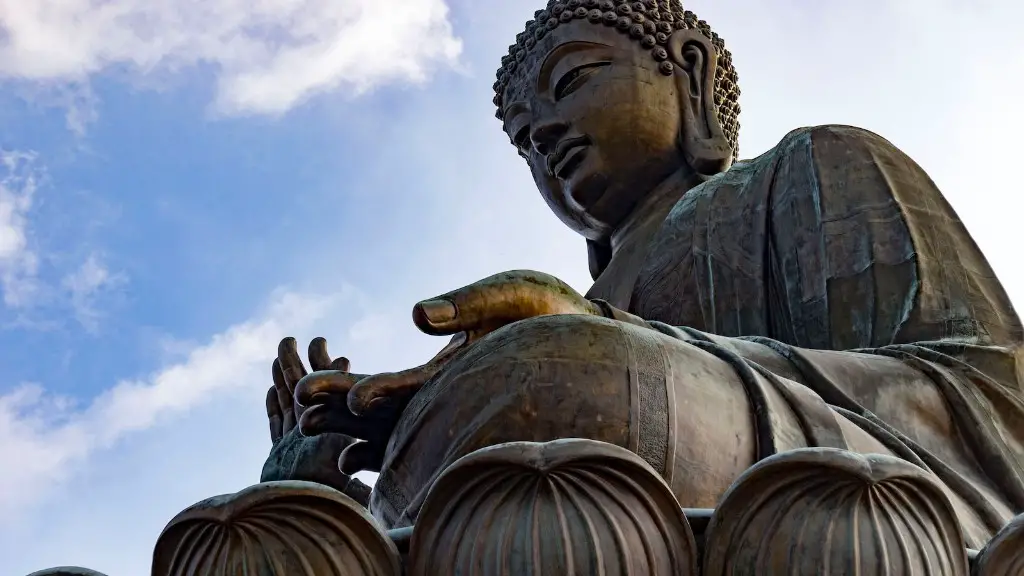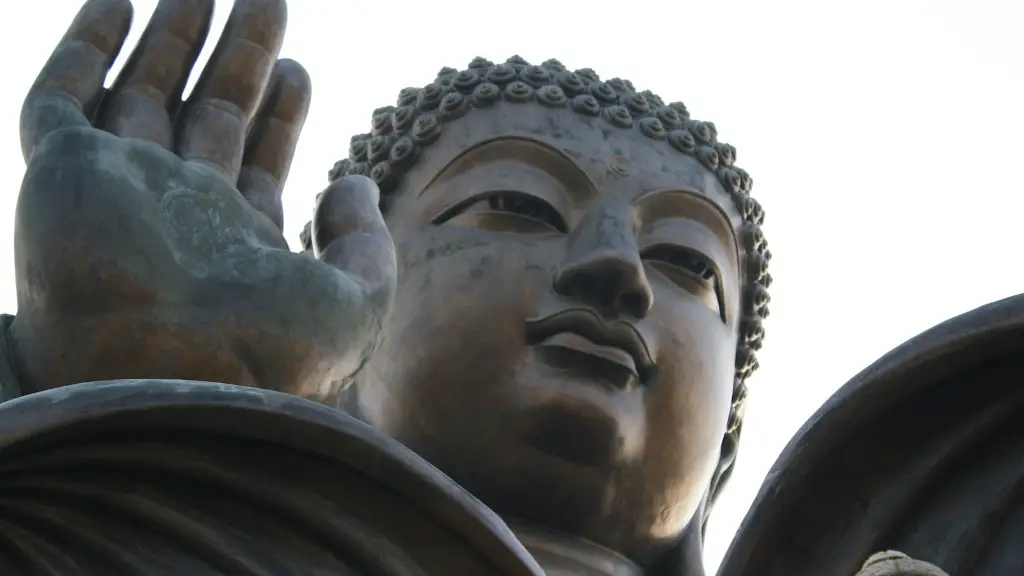Buddhism is a religion based on the teachings of Siddhartha Gautama, who was born in present-day Nepal in the 5th or 6th century B.C.E. After a period of asceticism and mediation, Gautama attained Nirvana, or enlightenment, and began teaching his gospel of love, compassion, and moderation. From Nepal, Buddhism spread throughout China, Korea, Japan, Vietnam, and Tibet. In the 20th century, it began to take root in the West.
There is no one language of Buddhism, as the religion is practiced by people around the world in a variety of cultures. However, many of the key texts of Buddhism are written in Pali, a language that was once widespread in India and is now used mainly by Buddhist scholars.
What language do Buddhist speak?
Pali is a native language of the Indian subcontinent and is the liturgical language of Theravada Buddhism. The language is part of the Indo-European language family and is related to Sanskrit. Pali is written in a variety of scripts, including Brāhmī, Kharosthi, Khmer, Mon-Burmese, Thai, Sinhala and transliteration to the Latin alphabet.
Ancient Buddhist scripture and doctrine developed in several closely related literary languages of ancient India, especially in Pali and Sanskrit. Pali is the language of the Theravada canon, while Sanskrit is the language of the Mahayana canon. Both canons include texts that are preserved in other languages, including Chinese and Tibetan.
Is Buddhism a Chinese or Indian religion
Buddhism is one of the oldest religions in the world, and it has had a significant impact on Indian culture and society. India is the birthplace of Buddhism, and the religion is part of India’s spiritual heritage. When India was at the height of its power, Indian priests and scholars travelled abroad and spread Buddhism widely: across Tibet and China and then on to Japan, and throughout Southeast Asia via Sri Lanka. Buddhism has been a significant force for peace and tolerance in the world, and it remains an important religion in India today.
Buddhism is a religion that was founded by Siddhartha Gautama, also known as the Buddha, in the 6th century BC in India. It is based on his teachings, and is divided into two main branches: Mahayana and Theravada.
Mahayana Buddhism, also known as the “Greater Vehicle”, is the branch that spread to Japan. It emphasizes the importance of helping others achieve enlightenment, and of working towards the common good. Theravada Buddhism, on the other hand, focuses on individual enlightenment, and is more prevalent in Southeast Asia.
How do Buddhists say hello?
When we say “Amituofo” to each other, we are expressing a wish for the other person’s happiness and well-being. This simple act can bring a sense of peace and happiness to both Buddhists and non-Buddhists alike. Moreover, chanting “Amituofo” can help us to transform our own negative thoughts and cultivate a more positive outlook.
Siddhartha Gautama was the first person to reach a state of enlightenment, and is known as the Buddha. Buddhists do not believe in any kind of deity or god, but there are supernatural figures who can help or hinder people on the path towards enlightenment.
What type of religion is Buddhism?
Buddhism is a religion that does not believe in a unique creator God. Instead, it sees ultimate reality, Nirvana, as beyond the many long-lived gods that it recognizes. This makes it a kind of trans-polytheism.
Sanatana Dharma is one of the oldest religions in the world. Many Hindus refer to their religion as Sanatana Dharma. The word Hindu is an exonym and it is believed that the term Hinduism was coined by British colonists in the 18th century to refer to the indigenous religions of the subcontinent.
What are the 3 main Buddhist beliefs
Buddhism teaches that the actions of a person’s life will determine their fate in their next life. This is known as the law of karma. The concept of rebirth also plays a role in this religion, as Buddhists believe that a person’s soul will be reborn into another body after they die. The last major belief of Buddhism is that everything in life is temporary and nothing lasts forever.
There are inherent and fundamental differences between Buddhism and Christianity. One significant element is that Christianity is monotheistic and relies on a God as a Creator, while Buddhism is generally non-theistic and rejects the notion of a Creator God. This means that Christianity relies on a divine source for values, while Buddhism does not. This difference is significant because it means that Buddhism is more focused on internal values, while Christianity is more focused on external values.
Do Buddhists believe Hindu gods?
Buddhism does not accept the Hindu theory of a creator deity (Ishwara) While Buddhism inherited some practices and ideas from the previous Indian yogic traditions, its understanding is different than that of Hindu teachings (such as those found in the Bhagavad Gita). In Buddhism, there is no supreme being or creator god that controls our destiny. Instead, we are responsible for our own actions and creating our own karma. Buddhism teaches that through our actions and thoughts, we can create positive or negative karma, which will determine our future experiences and whether we will attain enlightenment.
Buddhism first originated in India in the 6th century BC. It is a non-theistic religion ie it doesn’t believe in a creator God, unlike theistic religions such as Christianity.
What are the 3 main religions in Japan
The Japanese religious tradition is made up of several major components, including Shinto, Japan’s earliest religion, Buddhism, and Confucianism. Christianity has been only a minor movement in Japan.
Buddhism is a religion that promotes peace, love, and compassion. It is based on the teachings of Siddhartha Gautama, who is also known as the Buddha. Buddhism is a way of life for many people all over the world.
Can I wear jeans to a Buddhist temple?
Hi there,
Just wanted to remind everyone that short shorts, mini-skirts, short skirts, torn jeans, see through, vests, tight fitting trousers or leggings are not allowed to be worn as outer garments, for both ladies and gentlemen.
Thanks!
When worshipping, Buddhists may sit on the floor barefoot and face an image of Buddha. They will listen to monks chanting from religious texts, perhaps accompanied by instruments, and take part in prayers. This helps them to focus on the Buddha and their own spiritual journey.
Do Buddhists say thank you
Thankfulness is at the heart of Shin Buddhism. We don’t strive to achieve enlightenment or accumulate good karma. We simply give thanks for the life we have been given.
This attitude of thankfulness leads to contentment and peace of mind. We appreciate the good fortune we have, even in the midst of difficult circumstances. And we know that we can always find something to be grateful for.
When we live with an attitude of thankfulness, we are open to receiving even more good things in our lives. We become like a magnet, attracting more and more blessings. So let us practice thankfulness each and every day!
Buddhism has always been against the consumption of alcohol since its early days. This is because alcohol is seen as a hindrance to the path of Enlightenment. It is believed that alcohol not only harms the individual but also causes harm to others and disrupts the harmonious order of society.
Warp Up
There is no definitive answer to this question as Buddhism does not have a single, central authority. While there are many schools and traditions within Buddhism, there is no one official language that is used universally by all Buddhists. In some cases, the language of Buddhism is determined by the country or region where it is practiced, while in others, various texts and teachings may be translated into different languages to make them more accessible to a wider audience. Some of the more commonly used languages for Buddhism include Tibetan, Chinese, Pali, Sanskrit, and English.
There is no one answer to this question as Buddhism is practiced by people all over the world and there are many different languages spoken by Buddhists. However, some of the most common languages spoken by Buddhists include Chinese, Japanese, Tibetan, and Theravada.




